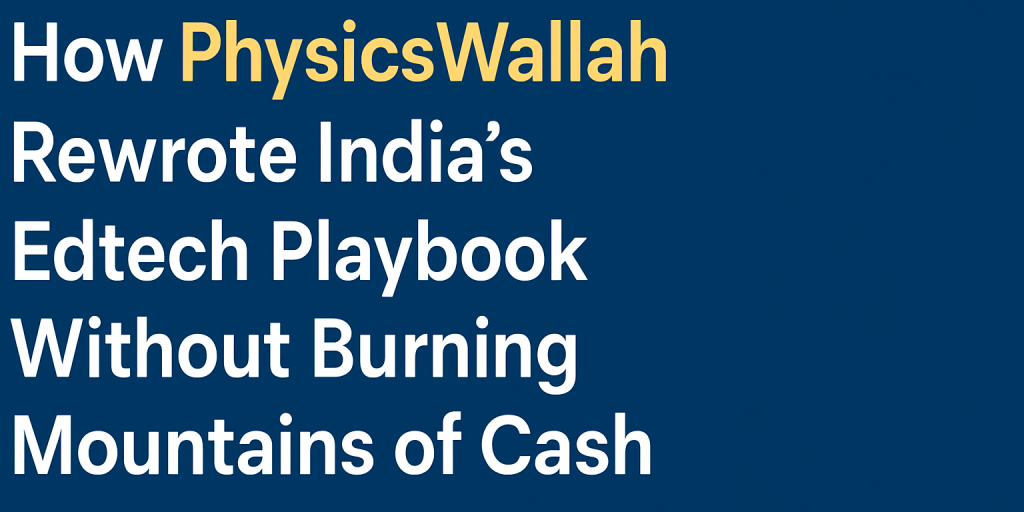Suppose you’ve been following India’s edtech drama over the last few years. In that case, you probably know how chaotic the space has been — big startups raising ridiculous amounts of money, then losing even more just to stay relevant. And right in the middle of all this noise, PhysicsWallah (PW) quietly built a business that feels almost… old school. Slow, steady, frugal, and weirdly sincere.
This is the story of how Alakh Pandey’s modest YouTube project ended up challenging an entire industry — and winning.
Table of Contents
The Humble Beginning: A YouTube Teacher Who Accidentally Built a Brand

Let’s be honest: when Pandey first started uploading physics lessons, nobody — probably not even him — expected this to become a billion-dollar company. His videos were raw. Sometimes the mic cracked, sometimes the chalk screeched, and sometimes he rambled like teachers do when they go off-topic. But students loved it.
Because it felt real. Not polished. Not scripted. Just a passionate teacher being himself.
By 2020, PW shifted from completely free content to offering affordable paid courses. And because the trust was already there, students didn’t think twice.
The Edtech Rulebook PW Refused to Follow
Around the same time, almost every big edtech brand was spending crores on marketing campaigns and celebrity tutors. PhysicsWallah did none of that.
- No massive ad blitzes.
- No aggressive sales calls.
- No crazy discounts that magically disappear in two weeks.
- PW simply focused on value and credibility. And honestly, it worked better than any marketing plan they could’ve paid for.
In 2022, they raised their first big funding — $100 million — but still behaved like a middle-class household that calculates electricity units before turning on the AC. Their frugality wasn’t a strategy; it was part of their DNA.
PhysicsWallah Growth Strategy
While the big players were haemorrhaging money, PW did something almost shocking for an edtech startup — they made profits.
Their growth came from:
- A massive, loyal YouTube audience
- Affordable pricing
- High-quality teaching
- Word of mouth (the most underrated marketing in India)
In a space obsessed with “hypergrowth,” PW took the “let’s not blow up our bank balance” route. And honestly, more startups should try it.
Scaling the PW Way: Thoughtful, Not Flashy
1. Offline Centers That Don’t Feel like Overpriced Coaching Institutes
PW opened Vidyapeeth and Pathshala centers — simple, hybrid coaching spaces that students actually felt comfortable in. No fancy tech walls or futuristic branding. Just classrooms that worked.
2. Smart Acquisitions
They didn’t buy companies just to look big in the news. They picked smaller, niche players to expand into new exam categories.
3. The Tier-II and Tier-III Advantage
While other edtech giants were obsessed with metros, PW quietly built a loyal user base in India’s smaller cities — where education is both an aspiration and a necessity.
PhysicsWallah Funding News
In 2024, PW raised another $210 million, pushing its valuation to $2.8 billion. And unlike the dramatic “fundraise for survival” stories we’ve seen recently, this round was about growth — real growth.
The money is likely going into:
- Offline expansion
- New tech infrastructure
- Better content
- And possibly (whispers) gearing up for an IPO in a few years
- But knowing PW, they’re not rushing anything.
- At the Heart of It All: The Same Old Mission
Even as the brand grows, PhysicsWallah still sticks to its original mission — to give students a good education at prices they can actually afford. That’s a rare thing in an industry where many businesses eventually forget why they started.
And Pandey? He still talks like a teacher first and a founder second. That’s probably why students still connect with him.
Why the PW Model Matters (Now More Than Ever)
- The edtech bubble has burst; PW shows what sustainable growth looks like.
- Trust beats advertising — and PW proved it at scale.
- Lean operations aren’t just cost-saving; they’re a competitive moat.
PhysicsWallah isn’t just another unicorn. It’s a reminder that purpose + patience can still build great companies.
Challenges Ahead (Because Every Good Story Needs Some)
Of course, it’s not all rosy:
- Offline centers are expensive.
- Competition isn’t going away.
- The pressure of scaling profitably is real.
But PW has beaten odds before, and if their trajectory is anything to go by, they’ll likely keep surprising the market.
Final Takeaway
PhysicsWallah didn’t “hack” the startup game. They simply didn’t play it the way others did. And maybe — just maybe — that’s exactly why they won.

NextWhatBusiness Research Desk represents the editorial research function at NextWhatBusiness.
Content published under the desk is based on independent research, operator-level observations, and analysis of small, medium, and franchise-led business models in India.
The focus is on practical decision-making — including capital requirements, operational effort, and risk factors — rather than promotional or brochure-driven information.
Some articles reflect editorial judgment based on observed patterns and may include opinionated analysis where appropriate.
Editorial oversight is provided by Rupak Chakrabarty, Editor, NextWhatBusiness.



